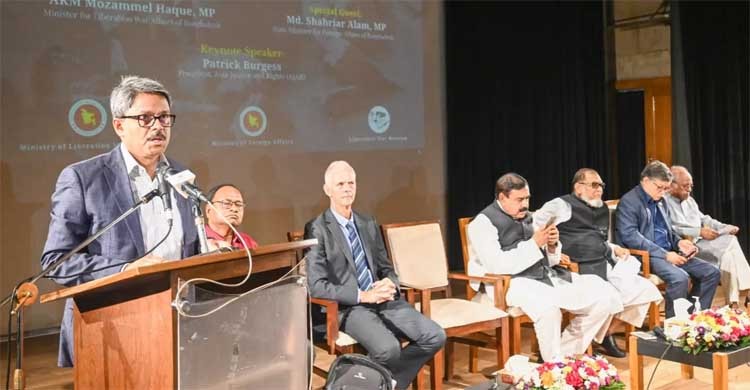Researchers, scholars urged to present facts of Bangladesh genocide before global community
25 March 2023, 05:10 pm | Updated: 06 April 2025, 01:20 pm

State Minister for Foreign Affairs Md. Shahriar Alam on Saturday called upon genocide scholars, researchers, civil society organisations, human rights activists, print and electronic media to present before the global community the facts and figure of Bangladesh genocide.
It is the moral obligation on the States and international community to show due respect to the victims of Bangladesh genocide and thus demonstrate their commitment towards the promotion and protection of human rights, he said.
Bangladesh Genocide was hardly discussed and the victims were hardly remembered since 1975 till the Awami League formed the government in 1996, said the State Minister while speaking at a programme marking the Bangladesh Genocide Day at the Liberation War Museum.
“Rather deliberate attempts were made to distort the facts and figure of Bangladesh genocide during that period,” he said.
Liberation War Affairs Minister AKM Mozammel Haque spoke as the chief guest while President of Asia Justice and Rights Barrister Patrick Burgess presented the keynote speech.
Foreign Secretary Masud Bin Momen, among others, spoke at the discussion.
After the brutal killing of Bangabandhu on 15 August 1975, the State Minister said, a dramatic change appeared to take place in official policy towards the issue of the 1971 genocide under the military government.
The Collaborators Act 1972 was repealed, all those leading war criminal-suspects who had fled the country and lost citizenship rights, were invited to return, he said, adding that many of the war criminals were rehabilitated into the mainstream politics and were offered to enjoy state power.
The State Minister said around 32 years of 52 years since independence, the government was led by pro-Pakistani forces.
“I can assure everyone today that the government under the visionary leadership of Prime Minister Sheikh Hasina would continue its sincere efforts to achieve recognition of 1971 genocide in Bangladesh,” Alam said.
In view of the then domestic and international context, he said, Bangabandhu declared limited amnesty for the local collaborators in December 1973.
However, the amnesty did not cover “anyone who killed people, raped and set fire or caused to damage people's homestead with explosives or convicted for damaging water-transport”.
Later, the war criminals and their sympathisers tried to misguide people with distorted facts that Bangabandhu pardoned all, Alam said.
Read more: Recognise March 25 as International Genocide Day: PM urges UN
“The intent was obvious, which was to destroy Bengali nationalism and shatter their political aspiration for a free and independent Bangladesh. So, it was cool-headed and deliberate act of genocide from their part,” said the State Minister.
He said the government has incorporated the history of the 1971 war and the genocide into the national curriculum. “This is aimed at ensuring that future generations are aware of the atrocities that took place and are committed to preventing similar events from occurring in the future.”
The State Minister said the government, under the leadership of Prime Minister Sheikh Hasina, is firmly committed to continue its efforts towards recognition by global community of the historical facts of Bangladesh genocide and the importance of preventing such acts of genocide from occurring in future anywhere in the world.
The Ministry of Foreign Affairs and the Bangladesh Missions abroad have been actively working to internationalize the issue of the genocide committed during the Bangladesh Liberation War, he said.
As a result of our combined efforts, he said, the Lemkin Institute for Genocide Prevention recognized the Bangladesh genocide 1971 on 31 December 2022.
“We also welcome recent bipartisan move in the US Congress for recognition of genocide committed by the Pakistani army in Bangladesh. We will continue to welcome any such initiatives by friendly countries while highlighting correct perspective of the Bangladesh Genocide,” he said.
Alam said media can also play a key role in mobilizing public opinion and shaping international responses to the genocide.
“The reporting of the international media has provided us a strong record of genocide, which has been important and will remain useful to hold the perpetrators accountable and get the recognition of Bangladesh genocide by the wider global community,” he said.






















